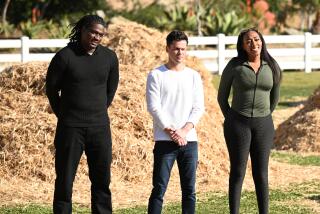Student Wins ‘Big Brother’ Finale
- Share via
A 21-year-old who lost a leg to cancer came away the big winner in CBS’ controversial “reality game” series “Big Brother.” An emotional Eddie McGee left the house Friday after 88 days and will collect $500,000.
Second-place winner Joshua Souza, a 23-year-old civil engineering student from Santa Maria, Calif., walks away with $100,000. Curtis Kin, a 28-year-old New York attorney, will receive $50,000 for his third-place finish. As the three finalists emerged from the 1,800-square-foot compound in Studio City that they entered July 4, hundreds of cheering spectators greeted them.
Most of the hourlong finale was spent with series anchor Julie Chen interviewing the previously banished housemates. Several believed McGee, a broadcasting student on a wheelchair basketball scholarship at the University of Texas, was the likely winner because of his competitive nature and his promise to help out his family with any prize money; 59% of the viewers who phoned in a vote to determine the outcome agreed.
Chen then talked briefly with McGee and Souza inside the “Big Brother” house before revealing the winner.
“Big Brother” began with 10 strangers--five women and five men ages 21 to 43--agreeing to be isolated from the outside world, including their families, with their every move recorded. The footage was fashioned into five, then six prime-time episodes each week, in addition to a continuous Internet feed. Every two weeks, the contestants voted two of their own to be banished with a viewer call-in poll determining which one would actually leave.
The series drew generally respectable ratings, averaging 9 million viewers a night and drawing the younger viewers that advertisers covet. But it failed to approach the popularity of CBS’ other summer “reality” series, “Survivor,” which became a cultural phenomenon while averaging more than 25 million viewers each episode.
Still, the network is currently soliciting applicants for a second edition of “Big Brother.”
The producers were clearly frustrated by the lack of conflict within the “Big Brother” house, situated on a studio lot, a sharp contrast to its European predecessors.
What little acrimony there was involved the only black male contestant, William “Will Mega” Collins, who openly challenged his predominantly white housemates on issues of race and class. Collins, who producers later learned was a member of a black activist group, was the first to be “banished.”
More to Read
The complete guide to home viewing
Get Screen Gab for everything about the TV shows and streaming movies everyone’s talking about.
You may occasionally receive promotional content from the Los Angeles Times.







